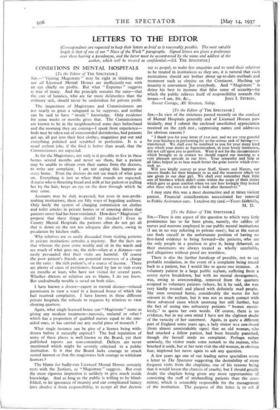CONDITIONS IN MENTAL HOSPITALS
LETTERS TO THE EDITOR
[Correspondents are requested to keep their letters as brief as is reasonably possible. The most suitable length is that of one of our " News of the Week" paragraphs. Signed letters are given a preference over those bearing a pseudonym, and the latter must be accompanied by the name and address of the author, which will be treated as confidential.—Ed. THE SPECTATOR.] [To the Editor of THE SPECTATOR.] SIR,—" Visiting Magistrate " may be right in thinking that not all Licensed Mental Homes are inefficiently run with an eye chiefly on profits. But what " Expertus " suggests is true of many. And the principle remains the same—that the care of lunatics, who are far more defenceless than the ordinary sick, should never be undertaken for private profit.
The inspections of Magistrates and Commissioners are not nearly so great a safeguard as he supposes, and neither can be said to have " inside " knowledge. Only residence for some weeks or months gives that. The Commissioners are known to be in the neighbourhood some days beforehand and the morning they are coming—I speak from experience— beds may be taken out of overcrowded dormitories, bed patients got up, all put into their best clothes, magazines put out and everything polished and scrubbed to perfection. It is a usual asylum joke, if the food is better than usual, that the Commissioners are expected.
As for the Magistrates, not only is it possible to live in these homes several months and never see them, but a patient may be unable to obtain even their names from the doctors, to write any complaint. I am not saying this happens at every home. Even the doctors do not see much of what goes on. Everything is just so when their rounds are expected. A nurse who is thrusting bread and milk at her patient or pulling her by the hair, keeps an eye on the door through which he may come.
Accounts may be duly inspected, but even in non-profit- making institutions, there are fifty ways of beguiling auditors. Only lately the system of charging commission on clothes and toilet articles in private homes or of entering drives that patients never had has been ventilated. How does "Magistrate " propose that these things should be checked ? Even in County Mental Hospitals the patients often do not get all that is down on the not too adequate diet sheets, owing to peculation by kitchen staffs.
Why relatives are so easily dissuaded from visiting patients in private institutions • remains a mystery. But the facts are that whereas the poor come weekly and sit in the wards and see much of what goes on, the rich—often at a distance—are easily persuaded that their visits are harmful. Of course the poor patient's friends are potential removers of a charge on the rates : the rich patient's, of a source of income. There arc plenty of cases of petitioners, bound by law to visit every six months at least, who have not visited for several years. Whether doctors or relatives are to blame, I do not know. But undoubtedly trouble is saved on both sides.
I have known a doctor—expert in mental disease—refused permission to view a ward in a licensed house of which she had received complaints. I have known in three different private hospitals flat refusals to requests by relatives to view sleeping quarters.
Again, what single licensed house can "Magistrate" name as giving any modern treatment—narcosis, malarial or other ? which has a proportion of qualified nurses equal to the rate- aided ones, or has carried out any useful piece of research ?
What single instance can he give of a licence being with- drawn before it naturally expired ? The bad reputation of some of these places is well known to the Board, yet their published reports are non-committal. Defects are never mentioned which might be severely criticised in a public institution. Is it that the Board lacks courage to attack vested interest or that the magistrates lack courage to withdraw licences ?
The blame for badly-run Licensed Mental Homes certainly rests with the Justices, as "Magistrate" suggests. But even the most rigorous inspection is unlikely to give much inside knowledge. And as long as the public is willing to be blind- folded, to let ignorance of insanity and our complicated lunacy laws absolve it from responsibility, to accept all that doctors say as gospel, to make few enquiries and to send their relatives to be treated in institutions as they are, it is natural that such institutions should not bother about up-to-date methods and treatment such as obtains on the Continent. Hushing up insanity is convenient [for everybody. And "Magistrate " is doing his best to increase that false sense of security—by which the public relieves itself of responsibility towards the
insane.—I am, Sir, &c., JOAN I. STURGES.
Sunset Cottage, All Stretton, Salop.














































 Previous page
Previous page